
FISHERY TECHNOLOGY
Scope & Guideline
Advancing sustainable practices in fisheries science.
Introduction
Aims and Scopes
- Aquaculture Innovations:
Research on advancing aquaculture practices, including the development of novel feeding strategies, breeding techniques, and health management protocols to enhance fish production and sustainability. - Nutritional Analysis and Food Technology:
Studies focusing on the nutritional composition and preservation of fish and seafood products, exploring methods to improve quality, safety, and consumer acceptance. - Environmental Impact Assessments:
Investigations into the ecological effects of fishing practices and aquaculture on aquatic ecosystems, including studies on pollution, biodiversity, and habitat conservation. - Fisheries Management and Economics:
Analyses examining the socio-economic aspects of fisheries, including market dynamics, policy implications, and community engagement in sustainable practices. - Health and Safety in Seafood Production:
Research on food safety, including the detection of pathogens, antibiotic resistance, and the application of safe processing techniques in seafood production. - Traditional Knowledge and Practices:
Exploration of indigenous fishing methods, crafts, and cultural practices, highlighting their significance in contemporary fisheries management.
Trending and Emerging
- Sustainable Aquaculture Practices:
Research focusing on sustainable methods in aquaculture, such as biofloc technology and integrated multi-trophic aquaculture, has surged, reflecting a global push towards environmentally friendly fish farming. - Food Safety and Quality Control:
There is an increasing emphasis on ensuring food safety in seafood production, with studies exploring antimicrobial resistance, pathogen detection, and innovative preservation techniques gaining prominence. - Climate Change Adaptation:
Research addressing the impacts of climate change on fish populations and fisheries practices is emerging, highlighting the need for adaptive strategies in management and conservation efforts. - Functional Foods and Nutraceuticals from Seafood:
The exploration of health benefits associated with seafood consumption and the development of functional food products are trending, driven by consumer interest in health and wellness. - Technological Innovations in Fisheries:
There is a growing interest in the application of new technologies, such as satellite monitoring for fisheries management and the use of nanomaterials in seafood processing, indicating a shift towards integrating technology in fisheries.
Declining or Waning
- Traditional Fishing Methods:
Research on traditional fishing practices has diminished, possibly due to a shift towards modern, technology-driven approaches and a focus on sustainability over heritage practices. - Basic Biological Studies of Common Species:
There has been a noticeable reduction in studies focusing solely on the basic biological aspects of widely caught species, as the journal has shifted towards applied research with immediate implications for aquaculture and fisheries management. - Aquatic Plant Studies:
Research centered on aquatic plants, such as seaweeds unrelated to their economic or nutritional applications, appears to be waning as the journal emphasizes more commercially relevant topics. - General Reviews on Fisheries:
The frequency of broad review articles summarizing general fisheries knowledge has decreased, likely as the journal aims to provide more specific, targeted research findings that can influence practice and policy.
Similar Journals
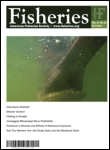
FISHERIES
Empowering researchers to protect our aquatic ecosystems.FISHERIES, published by WILEY, stands at the forefront of aquatic science and nature conservation, providing a vital platform for researchers and practitioners to share their findings and contribute to the sustainable management of global fishery resources. With an impressive impact factor and recognition within its field, the journal is currently ranked Q2 in both Aquatic Science and Nature and Landscape Conservation categories as of 2023, indicating its significant influence and quality of research dissemination. Covering a broad scope of topics from aquatic ecosystems to conservation strategies, FISHERIES facilitates cross-disciplinary discourse essential for understanding the ecological and socioeconomic aspects of fisheries. As the journal converges its years of operations from 1976 to 2024, it continues to adapt to emerging challenges in the field, making it an invaluable resource for professionals, researchers, and students alike who are dedicated to advancing knowledge and practices in sustainable fisheries management.
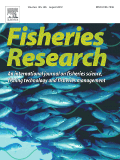
FISHERIES RESEARCH
Innovating strategies for effective fisheries management.Fisheries Research, published by Elsevier, is a leading international journal dedicated to the advancement and dissemination of research in the field of aquatic science. With an ISSN of 0165-7836 and E-ISSN 1872-6763, this influential journal has been pivotal in shaping fisheries management and conservation strategies since its inception in 1981. As a distinguished publication ranked in the Q1 category for Aquatic Science in 2023, it holds a prestigious position, reflected in its Scopus ranking of 73/247 in Agricultural and Biological Sciences. Fisher fisheries research encompasses a diverse array of topics such as fish population dynamics, ecosystem management, and sustainable practices, making it an essential resource for researchers, professionals, and students alike. Although it currently does not offer Open Access, the journal remains a crucial platform for disseminating high-quality research and fostering dialogue within the aquatic science community. With its address at Radarweg 29, 1043 NX Amsterdam, Netherlands, Fisheries Research continues to contribute significantly to the global discourse on fisheries science and management.
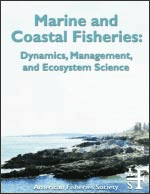
Marine and Coastal Fisheries
Innovating fisheries management for a sustainable tomorrow.Marine and Coastal Fisheries, published by Wiley, is a leading open access journal that has been dedicated to advancing the field of fisheries science since its inception in 2009. With an esteemed Q1 ranking in Aquatic Science and a Q2 ranking in Ecology, Evolution, Behavior and Systematics as of 2023, the journal actively contributes to the understanding and management of marine and coastal ecosystems.
This journal serves a diverse audience ranging from researchers and practitioners to students, providing a platform for high-quality peer-reviewed articles that address contemporary challenges in fisheries management and conservation. With a commitment to global accessibility, Marine and Coastal Fisheries promotes the dissemination of scientific knowledge to enhance sustainable practices in marine environments, making it an essential resource for those invested in the health of aquatic ecosystems. To explore the latest research and insights, visit the journal's website and engage with the thriving community of marine science professionals.
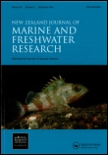
NEW ZEALAND JOURNAL OF MARINE AND FRESHWATER RESEARCH
Advancing Knowledge in Freshwater and Marine EcosystemsNEW ZEALAND JOURNAL OF MARINE AND FRESHWATER RESEARCH, published by Taylor & Francis Ltd, stands as a distinguished platform for the dissemination of innovative research in the realms of aquatic science and ecology. With an ISSN of 0028-8330 and E-ISSN 1175-8805, this journal has been curating significant scientific contributions since its inception in 1967, continuing through to 2024. Recognized in the Q2 category across multiple relevant fields—including Aquatic Science, Ecology, and Water Science—this journal ranks notably in Scopus, with a 74th percentile for Ecology, Evolution, Behavior and Systematics, highlighting its impact and relevance within the scientific community. Though not an open-access publication, its rigorous peer-reviewed articles offer insights that resonate with researchers, professionals, and students who are passionate about advancing our understanding of freshwater and marine ecosystems. By fostering a collaborative space for ecological and environmental inquiries, the NEW ZEALAND JOURNAL OF MARINE AND FRESHWATER RESEARCH is essential for those aiming to contribute to the vital conversations around biodiversity, conservation, and sustainable management of aquatic resources.

INDIAN JOURNAL OF FISHERIES
Exploring the depths of fishery research in India.Welcome to the Indian Journal of Fisheries, an esteemed publication of the Central Marine Fisheries Research Institute, dedicated to advancing the field of aquatic sciences. Established in 1974, this journal serves as a crucial platform for researchers, professionals, and students interested in the dynamics of fishery research within the Indian context and beyond. With an impact factor highlighting its rigorous peer-review standards, the journal publishes research that significantly contributes to the understanding of fisheries management, conservation, and sustainable practices. Although currently categorized in Q4 for Aquatic Science (2023) and ranked #215 out of 247 in Scopus, its increasing visibility demonstrates the journal's dedication to enriching the scientific discourse surrounding aquatic ecosystems. Located in Kochi, India, and published intermittently from 1977 to 2024, it seeks to bridge knowledge gaps while promoting innovative methodologies in fishery sciences. While not an open-access journal, it fosters a vital exchange of scholarly work that informs fishing practices, policy, and ecological considerations vital to both national and global fisheries. Join us in exploring the intricate world of fisheries through our comprehensive collection of research articles, reviews, and case studies.

Turkish Journal of Fisheries and Aquatic Sciences
Innovating research for thriving aquatic ecosystems.Turkish Journal of Fisheries and Aquatic Sciences, published by the CENTRAL FISHERIES RESEARCH INST, is a key resource in the fields of Fisheries and Aquatic Sciences, catering to a global community of researchers and professionals. With its ISSN 1303-2712 and E-ISSN 2149-181X, this journal offers an engaging platform for the dissemination of high-quality research from Turkey, covering critical topics within Animal Science and Aquatic Science. As a third quartile journal in both categories (Q3, 2023), it provides valuable insights, contributing to a growing body of literature that addresses aquatic ecosystems, fisheries management, and biodiversity conservation, thereby enhancing the sustainability of aquatic resources. The journal has shown considerable impact, ranking 144th in Animal Science & Zoology and 116th in Aquatic Science within Scopus, reflecting its relevance and credibility within the academic community. Operating from 2008 to 2024, it invites open access submissions to foster collaboration and knowledge sharing among scientists, students, and practitioners alike, reinforcing its dedication to advancing the science of aquatic ecosystems.

ISRAELI JOURNAL OF AQUACULTURE-BAMIDGEH
Fostering collaboration and knowledge in the aquaculture community.Welcome to the Israeli Journal of Aquaculture-Bamidgeh, published by AquacultureHub Inc, a pivotal platform dedicated to advancing the field of aquaculture studies since its inception in 1988. With a focus on innovative research and practical applications within the realms of Agronomy and Aquatic Sciences, this journal has established a reputation for disseminating high-quality findings that contribute to sustainable practices in aquatic farming. The journal, although classified in the Q3 and Q4 quartiles for its respective categories, offers valuable insights for researchers and practitioners alike, allowing them to stay abreast of developments in aquaculture challenges and solutions. While it's currently not an Open Access journal, the Israeli Journal of Aquaculture-Bamidgeh is committed to providing a thorough avenue for scholarly exchange and fostering collaborations across the global aquaculture community. Explore impactful studies and the latest trends to enhance your knowledge and research in this vital sector.

Marine Life Science & Technology
Transforming marine knowledge into impactful technologies.Marine Life Science & Technology is a premier journal published by SPRINGERNATURE, dedicated to advancing research in the vibrant fields of Aquatic Science, Biotechnology, Ecology, Evolution, Behavior and Systematics, and Oceanography. Since its inception in 2019, the journal has rapidly gained recognition, achieving a distinguished Q1 quartile ranking across multiple categories as of 2023. With impressive Scopus ranks—including 10th in Aquatic Science and 7th in Oceanography—this journal serves as a vital platform for scholars, professionals, and students to disseminate original research, innovative technologies, and critical reviews related to marine ecosystems and biotechnological applications. Based in Germany, Marine Life Science & Technology fosters open collaboration and knowledge sharing, vital for addressing contemporary challenges in marine and aquatic environments, ultimately contributing to sustainable development and ecological preservation.
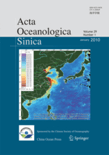
ACTA OCEANOLOGICA SINICA
Innovating Insights into Aquatic EcosystemsACTA OCEANOLOGICA SINICA, published by SPRINGER, stands as a significant voice in the fields of Aquatic Science and Oceanography, contributing vital research and insights since its inception in 1985. With an ISSN of 0253-505X and an E-ISSN of 1869-1099, this journal maintains a strong international focus, delivering high-quality peer-reviewed articles that address pressing marine and freshwater environmental issues. Although it operates under a subscription model, its Q3 ranking in both Aquatic Science and Oceanography demonstrates its solid standing within Scopus, placing it in the 48th and 44th percentiles respectively. The journal aims to foster knowledge exchange and collaboration among researchers, professionals, and students by providing a platform for innovative studies and comprehensive reviews. With a dedicated editorial board and a commitment to advancing scientific understanding, ACTA OCEANOLOGICA SINICA serves as an essential resource for anyone engaged in the study of oceanographic phenomena and aquatic ecosystems.
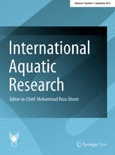
International Aquatic Research
Empowering aquatic scientists to make waves in research.International Aquatic Research, published by the Islamic Azad University, Tonekabon Branch, is a vital open-access journal dedicated to advancing the field of aquatic sciences since its inception in 2009. With an ISSN of 2008-4935 and an E-ISSN of 2008-6970, the journal plays a significant role in disseminating high-quality research findings from Iran and around the globe. It covers a broad range of topics in aquatic biology, fisheries science, and marine ecology, making it a valuable resource for researchers, professionals, and students alike. As of 2023, it ranks in the third quartile (Q3) of the aquatic science category with a Scopus rank of #138 out of 247 in Agricultural and Biological Sciences, reflecting its growing influence in the field. With a commitment to promoting scientific knowledge and fostering collaboration among aquatic research communities, International Aquatic Research is positioned as an essential platform for those dedicated to understanding and conserving marine and freshwater environments.